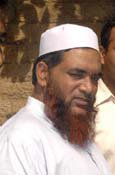Maoist Communist terrorists surrender/caught
Dreaded Maoist arrested in Bihar
Sasaram Bihar | January 29, 2006 5:43:22 PM IST
Dreaded CPI(Maoist) activist Sanjay Paswan, responsible for the killing of eight policemen, was arrested at Nimhat village under Nauhatta police station of the Rohtas district last night.
Police today said acting on a tip-off, a sleuth of local police raided a hideout at Nimhat village and arrested the activist.
Sanjay was responsible for triggering a landmine blast at Gogadih village under Chainpur police station of the Kaimur district on January 13 in 2001, killing eight policemen on the spot.
The Maoist was at large since then, police added.
Vital clues were provided by the arrested Maoist during intensive interrogation, police claimed.
Maoist Dy Commander surrenders
Visakhapatnam | January 29, 2006 9:46:57 PM IST
A Deputy Commander of Gurthedu Dalam of CPI (Maoists) today surrendered before the police at Narasipatnam in the district.
Speaking to UNI here, Officer on Special Duty Vineet Brijlal said G Nooka Raju alias Rajesh expressed a desire to join the mainstream.
Rajesh who belonged to Chapuratipalem Village of G K Veedi Mandal had been involved in various incidents, including the recent attack on Sileru Police Station and exchange of fire near Nerajartha village.
''The surrender of K Mahesh, a key member of Galikonda Dalam four days ago and government's assurance that no cases would be filed against those who gave themselves up besides the promise of a rehabilitation package seemed to have had the desired effect,'' Mr Brijlal said.
We expect more naxals to surrender in the district. This would include not just the tribal youth lured by the insurgents but some of their leaders as well,'' Mr Brijlal said.
The OSD said, apart from some immediate relief, Rajesh would stand to gain Rs 50,000, which would be given to him to help him lead a normal life.
Labels: COMMUNIST-CRIMES, MAOISTS




